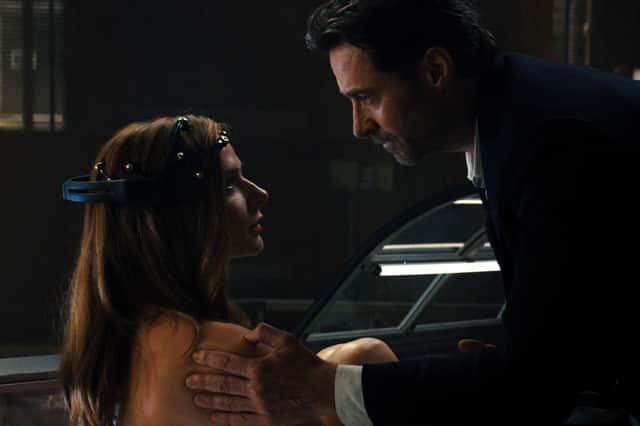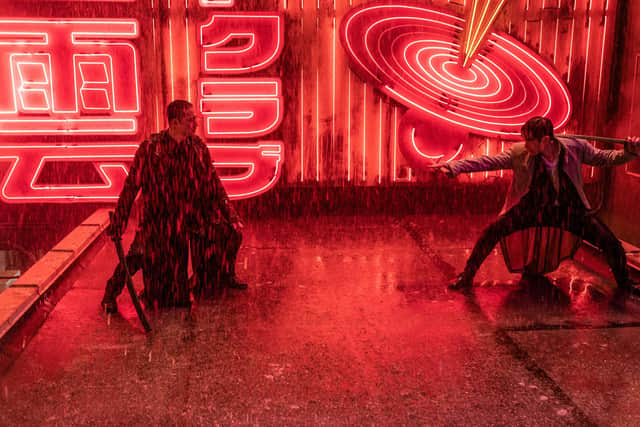Film reviews: Reminiscence | Censor | The Night House | Snake Eyes: GI Joe Origins


Reminiscence (12A) **
Censor (15) **
The Night House (15) ***
Snake Eyes: GI Joe Origins (12A) **
Having co-created the excellent Westworld for HBO, writer/director Lisa Joy makes her feature debut with Reminiscence, a disappointingly derivative futuristic sci-fi melodrama about a brain-hacking private investigator (Hugh Jackman) who becomes obsessed with tracking down the love of his life (Rebecca Ferguson) when she abruptly disappears. Set in a dystopian future where rising sea levels have flooded the cities and made dry land the preserve of the wealthy, it stars Jackman as a bourbon-drinking gumshoe called Nick Bannister, an ex-military interrogator who now scrapes a living by helping people re-live the past.
The idea is that Nick plugs them into a water-tank-like device that allows him to record and project a user’s memories onto a screen so they can re-experience key moments in their lives as clearly as when they first first happened. We’re told early on that this technology was developed by the military during a never-specified war that Nick fought in, but the film is very hazy about how it all works, with Jackman’s sub-Raymond Chandler voice-over delivering a lot of that’ll-do exposition that doesn’t really reckon with how memory actually functions.
Advertisement
Hide AdThat’s too bad because there’s an interesting bit of narrative trickery early on that hints at what could have been had Joy figured out a way to sustain it. Too often, though, the film takes the easier option of either explaining what we’ve just seen or conveniently letting Nick be privy to visuals that even his clients couldn’t have witnessed. Conceptually and visually, Joy also borrows heavily from brother-in-law Christopher Nolan’s Inception, Steven Spielberg’s Minority Report and the original cut of Ridley Scott’s Blade Runner, the one with the ruinous voice-over, something to which Jackman’s terribly written narration sounds like an un-ironic tribute.


There’s no denying that the low-budget British horror film Censor has great hook. Set amid the “video nasties" hysteria of the early 1980s, it revolves around Enid (Niamh Algar), a film censor who becomes convinced that a lurid slasher movie holds the key to the childhood disappearance of her presumed-dead sister. Sadly, what follows is pretty perfunctory as both horror film and mystery as co-writer and director Prano Bailey-Bond makes Enid the focal point of an unconvincingly rendered tabloid campaign against her employers just as her own grip on reality appears to be slipping.
What should be freaky and scary feels laboured and prescriptive as valid points about the misogyny of the genre are dogmatically made with stiff dialogue while news clips of Margaret Thatcher sounding off against the miners make unsubtle points about the real menace warping British society. It doesn’t even evoke the era very well. A little bit of faux-tracking might trigger memories of watching films on low-res VHS the way the scratches on Quentin Tarantino and Robert Rodriguez’s Grindhouse did for second-run movie prints, but video shops never rented films out with the cover art still in the boxes (as happens here) and there’s just not enough of the sort of fetishistic attention to detail that made, say, Peter Strickland’s giallo homage Berberian Sound Studio such a rich and disturbing deconstruction of the genre.
Much slicker horror thrills are on offer in The Night House, a ghost story bolstered by a great central performance from Rebecca Hall as a school teacher trying to keep it together after her husband’s recent shock suicide. Holed up in the beautiful lakeside home her late husband built for them, Hall’s grief-stricken Beth starts seeing ghostly apparitions in the architecture and finds her sleep frequently interrupted by loud music that comes on all by itself. With only a bottle of brandy for company, she begins questioning if she really knew her husband at all – at which point the David Bruckner-directed film moves into more familiar supernatural territory with a twist that’s not quite as good as the movie surrounding it. But jump scares are used sparingly and effectively and the sincerity with which Hall approaches her character – and the space Bruckner gives her – makes this nicely reminiscent of such late 1990s mainstream chillers as Stir of Echoes and The Sixth Sense.
The last movie based on the militaristic American GI Joe toy-line – 2013’s Dwayne Johnson-starring GI Joe: Retaliation – was so incomprehensible it was almost avant-garde. It’s perhaps small wonder, then, that Snake Eyes, the third such attempt to turn this into a viable movie franchise, has almost nothing to do with the convoluted mythology of the branded action figures. Or at least, not at first. An origins story for the titular ninja, the film casts Crazy Rich Asians’ Henry Golding in the lead and, for the first hour or so, turns his story into a weird, yakuza-themed riff on Infernal Affairs, which doesn’t seem especially appropriate for a movie that should be catering to pre-teen boys. But just when you start questioning why this has even been tagged a GI Joe movie at all, it starts throwing in more stuff involving giant anacondas and a mysterious crystal thing that shoots fire and makes people invincible. Thenceforth we’re suddenly supposed to care that this is all somehow tied up with the wider GI Joe mythology simply because its backers want to create a Marvel-style cinematic universe with lots of lucrative merchandising opportunities.


Reminiscence, Censor and The Night House are in cinemas from 20 August; Snake Eyes: GI Joe Origins is in cinemas now
A message from the Editor:
Advertisement
Hide AdThank you for reading this article. We're more reliant on your support than ever as the shift in consumer habits brought about by coronavirus impacts our advertisers.
If you haven't already, please consider supporting our trusted, fact-checked journalism by taking out a digital subscription at https://www.scotsman.com/subscriptions